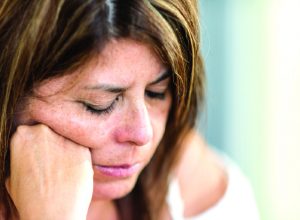by Michael Cohen, Director
Center for Brain Jupiter Florida
 Depression can ruin your life.
Depression can ruin your life.
You don’t feel like doing anything or going anywhere. It destroys your hope. It destroys yourjoy. It can make your body hurt. It bashes your self-esteem, impacts your relationships and gives you dark thoughts no one should have.
You can’t talk yourself out of depression.
You can’t just “cheer up.”
Keeping busy won’t make it go away.
Buying something new doesn’t work.
And for a great many people, taking anti-depressants doesn’t get rid of it, either.
In fact, research suggests that half or more of people who try anti-depressantsexperience no benefit at all. Furthermore, just about everyone who uses an anti-depressant experiences some sort of side effect like reduced libido, weight gain or loss, insomnia or dry mouth.Another issue is that once on anti-depressants, it can be very difficult to get off.
At Center for Brain we don’t like those odds very much.The vast majority of our clients with depression do experience relief, often permanently, and they almost never experience any side effects.
Unlike medication, which chemically forces temporary changes in the brain, neurofeedback helps you change your own brain – naturally – by harnessing its neuroplasticity – the brain’s innate ability to physically change.
Changing physically is the key. Depression is a physical problem, which helps explain why psychotherapy often doesn’t work on a long-term basis. Physical change – in the brain – is necessary for feeling better.
The two images below illustrate the physical nature of depression. The map on the left is of the brain of a person with a long history of depression, indicated by the orange and yellow area. These colors represent an excess amount of slow brainwave activity, which is generally associated with depression. The picture on the right displays the brain of a person who does not suffer from depression. Neurofeedback can help your brain look like the one on the right.
What does neurofeedback do?
The brain of someone with depression is “stuck” in a pattern of being down. We first conduct a brain map similar to the one above to identify the key problem areas in your particular brain. Using advanced biofeedback technology, neurofeedback guides the brain into becoming “unstuck” from this undesirable cycle and to keep it there. Once unstuck, the brain will function in a healthy way, producing fewer and less-intense dark moods.
Many of our clients report being in a better mood within just a few sessions. After completing their treatment regimen they tell us that the neurofeedback made them less susceptible to depression and moodiness.
Mark’s story
Mark’s parents first learned about his chronic depression when he confessed at age 21 to his mother that he was profoundly depressed. She took him to a doctor and was prescribed an anti-depressant. That would be the first of a nightmarish parade of one ineffective drug after the other recommended by a string of medical professionals with nothing else to offer.
Some drugs worked for a while and then stopped. Some didn’t work at all. One caused Mark to gain a tremendous amount of weight without alleviating his depression. When anxiety became part of the equation, he was prescribed as many as three drugs to take at the same time, which made him feel like a zombie.
At age 24 Mark attempted suicide by intentionally overdosing on a prescription medication. Frantic for other options, Mark’s mother Kim did an internet search, found Center for Brain and brought him to us from their home in New Jersey. Mark had two panic attacks on the airplane ride to Florida.
I had him seen by a local psychiatrist, who changed and minimized Mark’s medication, and an internist, who conducted a battery of tests. Those tests identified some nutritional deficits contributing to the depression. We put him on custom vitamins and started him on a daily gym workout.
We gave Mark a course of 11 neurofeedback sessions over the next four weeks.
Mark said he felt better after the very first session. He described his mood as “lighter.” He had ranked his depression as a“one” when he arrived (the worst on a 1-10 scale) and a “seven” when he went back home.
Mark had no panic attacks on the return flight home, and his mother told me that even on bad days, Mark is able to “pull himself out of” a bad mood.
It’s not uncommon for people Mark’s age to be depressed. Actually, depression can strike people of all ages.
Depressed children and teens are typically moody, argumentative, have lost interest in favorite activities and stop doing well in school. Adults often withdraw or avoid getting out. They may either find it difficult to work and participate in normal activities or may overdo it to the point of becoming workaholics. They may lose or gain excessive weight and sleep too little or too much.
If you’re feeling “down,” if you suspect you’re suffering from depression, if it’s not going away easily and you’d like to feel better without the use of medications, I invite you to come to my office and meet with me to determine if I think we can help. There’s no reason to suffer even one more day when there’s something available that really may change your life (and your brain).
About Center for Brain
Center for Brain is staffed by a team of compassionate professionals whose mission is to enhance the lives of people suffering from a variety of conditions that can be significantly improved with the help of neurofeedback and other brain technologies.
561-744-7616
Michael Cohen, Director
Center for Brain
Mike Cohen is a leading expert in brain biofeedback. For over 20 years he’s worked with clients, taught courses and provided consulting to MD’s and mental health professionals around the world, helping them incorporate into their practices new biofeedback technologies for chronic pain, anxiety and mood disorders, ADHD and neurological problems.
Center for Brain is located at:
550 Heritage Drive, Suite 140
Jupiter, FL 33458
561.744.7616
www.CenterforBrain.com
Check Also
RejuvaNATION MedSpa: Elevating Men’s Health to New Heights
Embark on a Journey to Revitalize Your Vitality Rediscover the joy of a spontaneous sex …
 South Florida Health and Wellness Magazine Health and Wellness Articles
South Florida Health and Wellness Magazine Health and Wellness Articles




